高中英语介词用法大全
高中介词的用法总结

高中介词的用法总结
高中英语中介词的用法总结如下:
1. 表示在某时间时,常用at、on、in等介词。
at常用来表示在具体的时间点前,如at 7:30;on用来表示在星期几、在某日以及在某一天的上午或下午,如on Monday、on March 1st等;in则常用来表示在一个较长的时间段里,如in the morning、in the afternoon、in a year等。
2. 表示地点时,常用in、at、over等介词。
in表示在一个范围内的某个地点,如in the field;at表示在一个具体的地点,如at the school gate;over则表示悬空或覆盖着某物,如over the table。
3. 表示方式时,常用by、with等介词。
by表示通过某种方式或手段,如by bus、by phone等;with则表示用某种工具或和某人一起做某事,如with a pen、with my friend。
4. 表示目的时,常用for、to等介词。
for表示为了某个目的而做某事,如for your help;to则表示某个动作的方向或指向,如to the school。
5. 表示比较时,常用than、as等介词。
than表示比较的对象,如I am taller than him;as则表示与某人或某物一样,如as tall as him。
以上是高中英语中介词的一些常见用法,希望对你有所帮助。
如果有任何疑问,建议咨询专业英语教师或者查阅英语语法书籍。
高中介词的用法归纳

高中介词的用法归纳一、介词的分类1、时间介词at:用于具体的时刻,如 at six o'clock。
in:用于较长的时间段,如 in the morning,in May,in 2023。
on:用于具体的日期或星期几,如 on Monday,on May 1st。
during:在期间,强调一段时间的过程,如 during the summer vacation。
for:表示持续的时间,如 for two hours。
since:自从以来,常用于现在完成时,如 since 2010。
until / till:直到,如 I will wait until you come2、地点介词at:用于较小的地点,如 at the bus stop。
in:用于较大的地点,如 in Beijing,in the room。
on:在上面,与表面有接触,如 on the table。
above:在上方,不接触表面,如 The plane is flying above the cloudsover:在正上方,垂直上方,如 There is a bridge over the river under:在下面,如 The cat is under the chairbelow:在下方,不一定垂直,如 The temperature is below zero between:在之间(两者),如 between A and B。
among:在之间(三者或三者以上),如 among the students。
3、方式介词by:通过方式,如 by bike,by bus。
with:使用工具,如 with a pen,with my hands。
in:用语言,如 in English,in Chinese。
4、其他常见介词of:的,如 a map of China。
to:朝,向,如 go to school。
from:从,如 from Beijing to Shanghai。
最新高中英语45个介词的基本用法
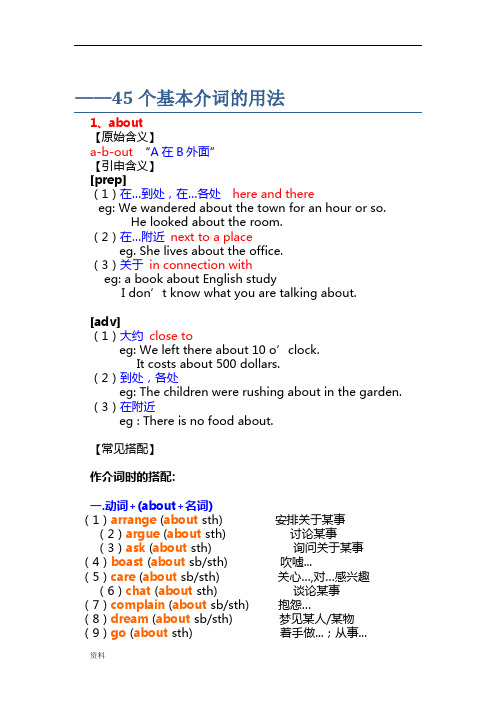
——45个基本介词的用法1、about【原始含义】a-b-out “A在B外面”【引申含义】[prep](1)在…到处,在…各处here and thereeg: We wandered about the town for an hour or so.He looked about the room.(2)在…附近next to a placeeg. She lives about the office.(3)关于in connection witheg: a book about English studyI don’t know what you are talking about. [adv](1)大约close toeg: We left there about 10 o’clock.It costs about 500 dollars.(2)到处,各处eg: The children were rushing about in the garden. (3)在附近eg : There is no food about.【常见搭配】作介词时的搭配:一.动词+(about+名词)(1)arrange (about sth) 安排关于某事(2)argue (about sth) 讨论某事(3)ask (about sth) 询问关于某事(4)boast (about sb/sth) 吹嘘...(5)care (about sb/sth)关心…,对…感兴趣(6)chat(about sth) 谈论某事(7)complain(about sb/sth) 抱怨…(8)dream (about sb/sth) 梦见某人/某物(9)go (about sth) 着手做...;从事...(10)hear (about sth) 听说...(11)know(about sth) 了解...(12)learn (about sth) 得知某事(13)put (about sth)散布(谣言等)(14)quarrel (about sth) 为...争吵(15)see (about sth) 负责处理...(16)talk(about sth) 谈论...(17)think (about sth) 考虑..(18)warn sb (about sth) 告诫某人关于某事(19)wonder(about sb/sth) 对.. 好奇(20)worry(about sb/sth) 对...担心二、名词+(about+名词)(1)concern (about sb/sth) 对…的关心/关怀(2)curiosity (about sb/sth) 对…的好奇(3)doubt (about sb/sth) 对…的怀疑(4)ethusiasm (about sth) 对…的热情(5)information (about sb/sth) 关于…的信息(6)remark (about sth) 对…的评论(7)opinion (about sth) 对…的意见(8)view (about sb/sth) 对...的观点三、be+adj+(about+名词)(1)be angry (about sth) 为…而生气(2)be anxious(about sth) 为…忧虑(3)be careful(about sth) 当心…(4)be cautious (about sth) 谨防...;对...持谨慎态度(5)be certain (about sth) 确信关于某事(6)be curious (about sth) 对…感到好奇(7)be disappointed (about sth) 对…感到失望(8)be excited (about sth) 对…感到兴奋(9)be glad/happy (about sth) 对…感到高兴(10)be hopeful (about sth) 对…抱有希望(11)be crazy/mad/wild (about sth)对…痴狂;酷爱某事(12)be nervous (about sth)为…感到不安/因...感到紧张(13)be optimistic/positive (about sth)对...是积极乐观的(14)be particular (about sb/sth) 对... 讲究,挑剔(15)be sad (about sth) 为…而难过(16)be serious (about sth) 对…认真(17)be sorry (about sth) 对...抱歉作副词时的搭配:名词+动词+about(1)sth come about某事发生(2)sth get about某事(尤指消息等)传开(3)sb turn about某人转身(4)sb wander about某人徘徊,游荡(5)sb walk about 某人走来走去2、above【原始含义】a-b-over“A在B上方”【引申含义】prep.(1)在…上方at or to a higher place than sth/sbeg: The sun rose above the horizon.(2)数目大于…/重量超过…/价格(能力、地位)高于…more than sth.; greater in number, level or age than sb./sth.eg: There is nothing in the store above 50 cents. (3)重要性或质量超过、胜过of greater importance or of higher quality than sb/sth eg. I rate her above most other players of her age. (4)声音超过…louder or clearer than another sound eg: I couldn’t hear her above the noise of the traffic. (5)不至于,不屑于做某事too good or too honest to do stheg. She is above suspicion.【常见搭配】一、动词+(above+名词)(1)live ( above one’s income) 入不敷出地生活(2)put A(above B) 把A看得比B更重要(3)rise (above sth) 克服...,不受....的影响(4)talk (above one’s head) 高深莫测地谈论二、be+(above+名词)(1)be (above oneself )兴高采烈= be in one’s high spirit(2)be (above one’s head)难以理解/超出某人理解能力3、across【原始含义】a-grass“一片草坪”,across指在平面上经过,就像人走过一片草坪那样。
高考英语介词用法大全

高考英语介词用法大全一,英语介词概述英语介词是一种没有形态变化,不能单独使用,介于动词与名词,名词与名词之间的一种虚词。
英语介词是仅次于英语动词的一个高考语法重点与难点项目。
英语介词必须带上宾语构成介词短语,或依附在不及物动词后面使用,介词短语可以在句子中充当状语,定语,表语和宾语补语。
二、英语介词的用法1、介于动词与名词之间①介于动词与名词之间使不及物动词能带宾语:listen to听 , look at看 , wait for 等待, knock at 敲(门), worry about 担心, talk with /about (与)谈论, work on工作 , dream about梦想 , depend on 依赖, 。
②介于动词与名词之间构成固定短语:look after照看look for 寻找look up 查找look through 浏览hear from 收到来信think of 想起ask for 索要try on 试穿try out 试用send for 派人去请lead to 导致laugh at 嘲笑give in 屈服turn off/on 关\开(电器)stand for 代表break into 闯入hand in 上交work out算出 take off 脱掉,起飞。
2.位于名词之前构成短语作状语①介词位于表时间的名词前,构成短语做时间状语:at ,in ,on, for ,during ,since ,before ,after ,by, from, until ,within 等。
(注意:有限定词修饰的时间名词不需要介词可以直接做状语)②介词位于表方位的名词前,构成短语做地点状语:in ,at ,on ,under ,over ,above ,below, into, through, cross ,between, along, beside, behind from等。
介词用法总结

介词用法总结介词是英语语法中一个重要的词类,用于表示名词、代词、动词和形容词等与其他词或短语之间的关系。
在不同的句子和语境中,介词具有不同的用法。
本文将对介词的用法进行总结,并提供相关的例句。
一、表示位置关系的介词1. in:在…之中,在(具体范围)。
例句:He is waiting in the car.(他正在车里等待。
)2. on:在…之上,在(水平面)。
例句:The book is on the table.(书在桌子上。
)3. at:在…地方,在(具体点)。
例句:She is studying at the library.(她在图书馆学习。
)4. by:在…旁边,靠近(某物)。
例句:He is standing by the door.(他站在门旁边。
)5. under:在…下面,在(某物)的底部。
例句:The cat is hiding under the bed.(猫在床下躲藏。
)6. between:在…之间(两者之间)。
例句:The restaurant is located between the bank and the supermarket.(这家餐厅位于银行和超市之间。
)二、表示时间关系的介词1. at:在(具体时间点)。
例句:She will meet her friend at 8 o'clock.(她将在8点钟见她的朋友。
)2. on:在(具体日期或星期)。
例句:I have a meeting on Monday.(星期一我有个会议。
)3. in:在(一段时间内)。
例句:He will travel to Europe in summer.(他将在夏天去欧洲旅行。
)4. during:在…期间,表示全程。
例句:I read a book during the flight.(我在飞行途中读了一本书。
)5. for:持续时间,表示时间段。
例句:They have been married for ten years.(他们已经结婚十年了。
高中英语语法 常用介词的用法
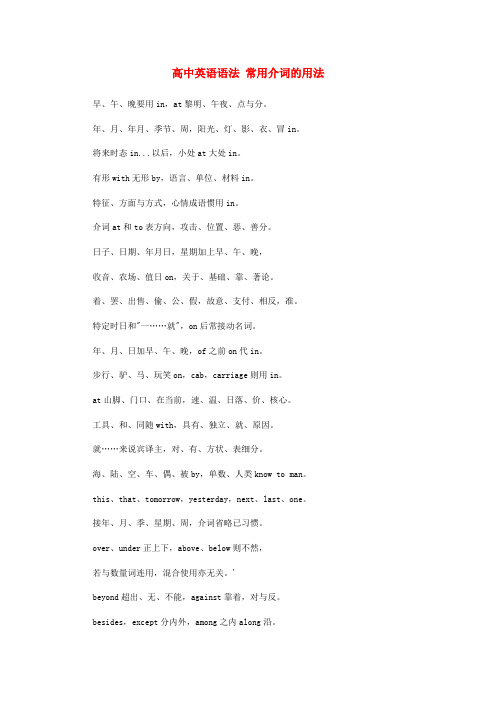
高中英语语法常用介词的用法早、午、晚要用in,at黎明、午夜、点与分。
年、月、年月、季节、周,阳光、灯、影、衣、冒in。
将来时态in...以后,小处at大处in。
有形with无形by,语言、单位、材料in。
特征、方面与方式,心情成语惯用in。
介词at和to表方向,攻击、位置、恶、善分。
日子、日期、年月日,星期加上早、午、晚,收音、农场、值日on,关于、基础、靠、著论。
着、罢、出售、偷、公、假,故意、支付、相反,准。
特定时日和"一……就",on后常接动名词。
年、月、日加早、午、晚,of之前on代in。
步行、驴、马、玩笑on,cab,carriage则用in。
at山脚、门口、在当前,速、温、日落、价、核心。
工具、和、同随with,具有、独立、就、原因。
就……来说宾译主,对、有、方状、表细分。
海、陆、空、车、偶、被by,单数、人类know to man。
this、that、tomorrow,yesterday,next、last、one。
接年、月、季、星期、周,介词省略已习惯。
over、under正上下,above、below则不然,若与数量词连用,混合使用亦无关。
'beyond超出、无、不能,against靠着,对与反。
besides,except分内外,among之内along沿。
同类比较except,加for异类记心间。
原状because of,、 owing to、 due to表语形容词under后接修、建中,of、from物、化分。
before、after表一点, ago、later表一段。
before能接完成时,ago过去极有限。
since以来during间,since时态多变换。
与之相比beside,除了last but one。
复不定for、找、价、原,对、给、段、去、为、作、赞。
快到、对、向towards,工、学、军、城、北、上、南。
but for否定用虚拟,复合介词待后言。
(完整版)高中英语介词用法大全
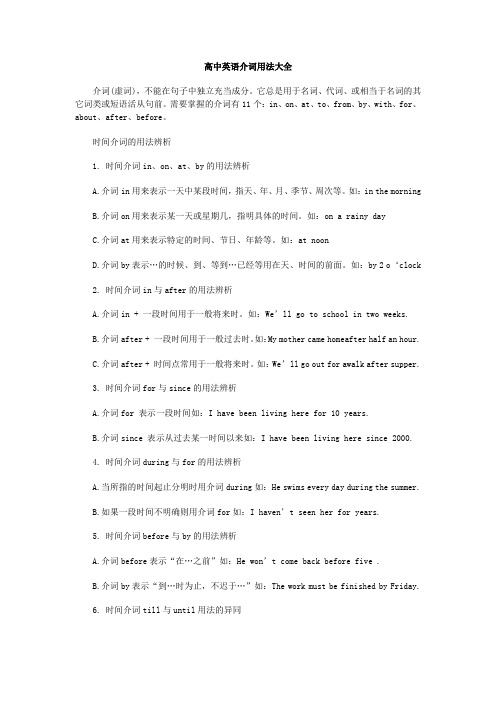
高中英语介词用法大全介词(虚词),不能在句子中独立充当成分。
它总是用于名词、代词、或相当于名词的其它词类或短语活从句前。
需要掌握的介词有11个:in、on、at、to、from、by、with、for、about、after、before。
时间介词的用法辨析1. 时间介词in、on、at、by的用法辨析A.介词in用来表示一天中某段时间,指天、年、月、季节、周次等。
如:in the morningB.介词on用来表示某一天或星期几,指明具体的时间。
如:on a rainy dayC.介词at用来表示特定的时间、节日、年龄等。
如:at noonD.介词by表示…的时候、到、等到…已经等用在天、时间的前面。
如:by 2 o‘clock2. 时间介词in与after的用法辨析A.介词in + 一段时间用于一般将来时。
如:We’ll go to school in two weeks.B.介词after + 一段时间用于一般过去时。
如:My mother came homeafter half an hour.C.介词after + 时间点常用于一般将来时。
如:We’ll go out for awalk after supper.3. 时间介词for与since的用法辨析A.介词for 表示一段时间如:I have been living here for 10 years.B.介词since 表示从过去某一时间以来如:I have been living here since 2000.4. 时间介词during与for的用法辨析A.当所指的时间起止分明时用介词during如:He swims every day during the summer.B.如果一段时间不明确则用介词for如:I haven’t seen her for years.5. 时间介词before与by的用法辨析A.介词before表示“在…之前”如:He won’t come back before five .B.介词by表示“到…时为止,不迟于…”如:The work must be finished by Friday.6. 时间介词till与until用法的异同A.till和until用在肯定句中,均可表示“直到…为止”,如:I will waittill(until)seveno'clock.B.till和until用在否定句中,均可表示“在…以前”或“直到…才”。
高中英语 介词搭配

高中英语介词搭配介词是英语语法中重要的一部分,用于表示名词与动词、形容词、副词之间的关系。
在高中英语中,常见的介词有at,in,on,with,by,about,for,from 等。
下面我们将详细介绍这些介词的搭配用法。
1. 时间介词at表示在某一点时间或具体时间,如at seven o’clock,at noon;in表示在一个时间范围或一天中的某个时间段内,如in the morning,in the afternoon;on表示在某一天或具体某一天的上下午晚上,如on Monday,on the afternoon of July 4th;for表示持续一段时间,如for three days,for a week;since表示自从某个时间点开始,如since 2000。
2. 地点介词at表示在某个小地点或具体地点,如at the school gate;in表示在一个较大的地点范围或建筑物内,如in the classroom;on表示在某个物体上面或表面,如on the table;over表示在某个物体的正上方,如over the bridge;above 表示在某个物体的垂直上方,但不一定是正上方。
3. 方式介词by表示以某种交通工具或方式进行移动或完成某件事情,如by bus,by email;with表示使用某种工具或伴随某种情况完成某件事情,如with pen and paper;in表示以某种语言、方式或风格进行某件事情,如in English。
4. 原因介词because表示因为某个原因或理由,如because of his illness;due to表示由于某个原因或理由,但与because有所区别;owing to表示由于某个原因或理由,也与because有所区别;thanks to表示由于某个原因或理由而感激某人或某事。
5. 条件介词if表示在某个条件下实现某件事情,如if it rains;unless表示除非某个条件不成立或不满足,如unless you study hard;provided that表示在某个条件下实现某件事情,与if相似。
高中英语介词的用法整理归纳
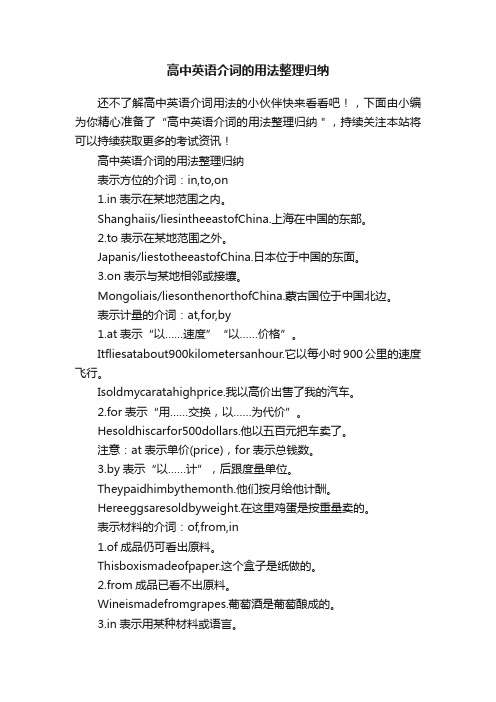
高中英语介词的用法整理归纳还不了解高中英语介词用法的小伙伴快来看看吧!,下面由小编为你精心准备了“高中英语介词的用法整理归纳",持续关注本站将可以持续获取更多的考试资讯!高中英语介词的用法整理归纳表示方位的介词:in,to,on1.in表示在某地范围之内。
Shanghaiis/liesintheeastofChina.上海在中国的东部。
2.to表示在某地范围之外。
Japanis/liestotheeastofChina.日本位于中国的东面。
3.on表示与某地相邻或接壤。
Mongoliais/liesonthenorthofChina.蒙古国位于中国北边。
表示计量的介词:at,for,by1.at表示“以……速度”“以……价格”。
Itfliesatabout900kilometersanhour.它以每小时900公里的速度飞行。
Isoldmycaratahighprice.我以高价出售了我的汽车。
2.for表示“用……交换,以……为代价”。
Hesoldhiscarfor500dollars.他以五百元把车卖了。
注意:at表示单价(price),for表示总钱数。
3.by表示“以……计”,后跟度量单位。
Theypaidhimbythemonth.他们按月给他计酬。
Hereeggsaresoldbyweight.在这里鸡蛋是按重量卖的。
表示材料的介词:of,from,in1.of成品仍可看出原料。
Thisboxismadeofpaper.这个盒子是纸做的。
2.from成品已看不出原料。
Wineismadefromgrapes.葡萄酒是葡萄酿成的。
3.in表示用某种材料或语言。
Pleasefillintheforminpencilfirst.请先用铅笔填写这个表格。
TheytalkinEnglish.他们用英语交谈。
表示工具或手段的介词:by,with,on1.by用某种方式,多用于交通。
Iwenttherebybus.我坐公共汽车去那儿。
高中英语语法介词
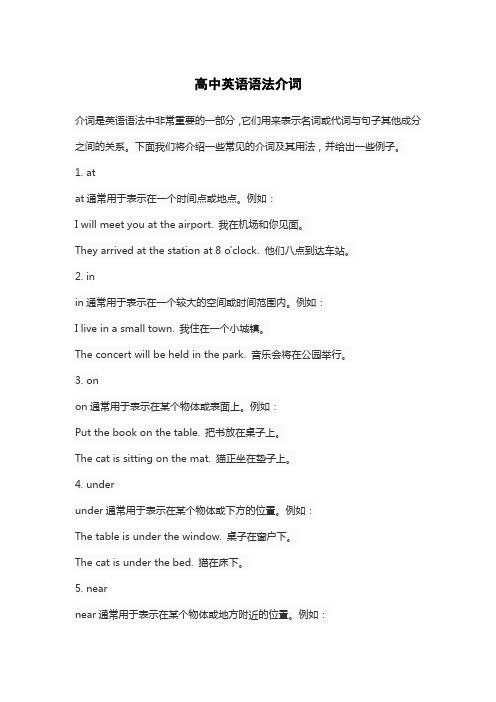
高中英语语法介词介词是英语语法中非常重要的一部分,它们用来表示名词或代词与句子其他成分之间的关系。
下面我们将介绍一些常见的介词及其用法,并给出一些例子。
1. atat通常用于表示在一个时间点或地点。
例如:I will meet you at the airport. 我在机场和你见面。
They arrived at the station at 8 o'clock. 他们八点到达车站。
2. inin通常用于表示在一个较大的空间或时间范围内。
例如:I live in a small town. 我住在一个小城镇。
The concert will be held in the park. 音乐会将在公园举行。
3. onon通常用于表示在某个物体或表面上。
例如:Put the book on the table. 把书放在桌子上。
The cat is sitting on the mat. 猫正坐在垫子上。
4. underunder通常用于表示在某个物体或下方的位置。
例如:The table is under the window. 桌子在窗户下。
The cat is under the bed. 猫在床下。
5. nearnear通常用于表示在某个物体或地方附近的位置。
例如:The school is near the railway station. 学校在火车站附近。
They sat near the fire. 他们坐在火堆旁边。
6. behindbehind通常用于表示在某个物体或人的后面位置。
例如:The car is behind the tree. 车在树后面。
The cat is behind the sofa. 猫在沙发后面。
7. beforebefore通常用于表示在某个物体或人的前面位置。
例如:The bus stop is before the bridge. 公交车站桥前面。
高中英语高考介词用法总结(基本用法+具体用法)
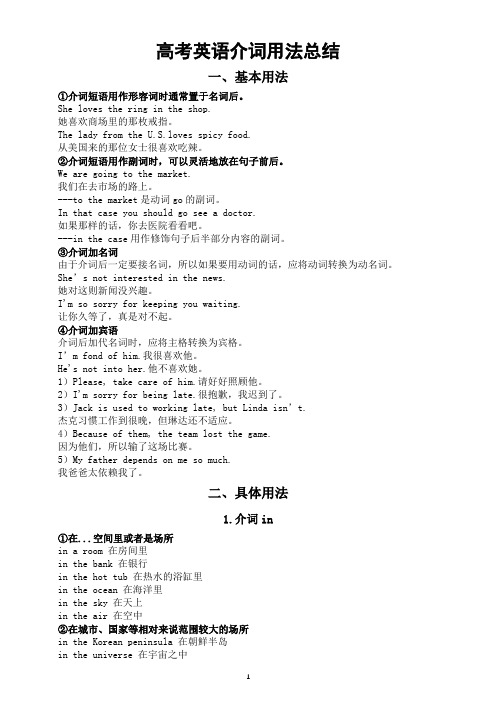
高考英语介词用法总结一、基本用法①介词短语用作形容词时通常置于名词后。
She loves the ring in the shop.她喜欢商场里的那枚戒指。
The lady from the U.S.loves spicy food.从美国来的那位女士很喜欢吃辣。
②介词短语用作副词时,可以灵活地放在句子前后。
We are going to the market.我们在去市场的路上。
---to the market是动词go的副词。
In that case you should go see a doctor.如果那样的话,你去医院看看吧。
---in the case用作修饰句子后半部分内容的副词。
③介词加名词由于介词后一定要接名词,所以如果要用动词的话,应将动词转换为动名词。
She’s not interested in the news.她对这则新闻没兴趣。
I'm so sorry for keeping you waiting.让你久等了,真是对不起。
④介词加宾语介词后加代名词时,应将主格转换为宾格。
I’m fond of him.我很喜欢他。
He's not into her.他不喜欢她。
1)Please, take care of him.请好好照顾他。
2)I'm sorry for being late.很抱歉,我迟到了。
3)Jack is used to working late, but Linda isn’t.杰克习惯工作到很晚,但琳达还不适应。
4)Because of them, the team lost the game.因为他们,所以输了这场比赛。
5)My father depends on me so much.我爸爸太依赖我了。
二、具体用法1.介词in①在...空间里或者是场所in a room 在房间里in the bank 在银行in the hot tub 在热水的浴缸里in the ocean 在海洋里in the sky 在天上in the air 在空中②在城市、国家等相对来说范围较大的场所in the Korean peninsula 在朝鲜半岛in the universe 在宇宙之中in the country 在乡村in the city 在城市里in Seoul 在首尔in Europe 在欧洲③年、月、季节等相对较长的时间in 2002 in the 1980sin March in springin winter in the 20th century④指早上、下午、晚上in the morning 在早上in the afternoon 在下午in the evening 在晚上对比: at noon 中午 at night 晚上⑤表示期间How could you finish he work in 3 days?这件事怎么可能在三天内完成?We can’t get to the island in 5 hours?我们不可能在五个小时之内到那个岛的。
高中英语知识点归纳介词的用法和种类
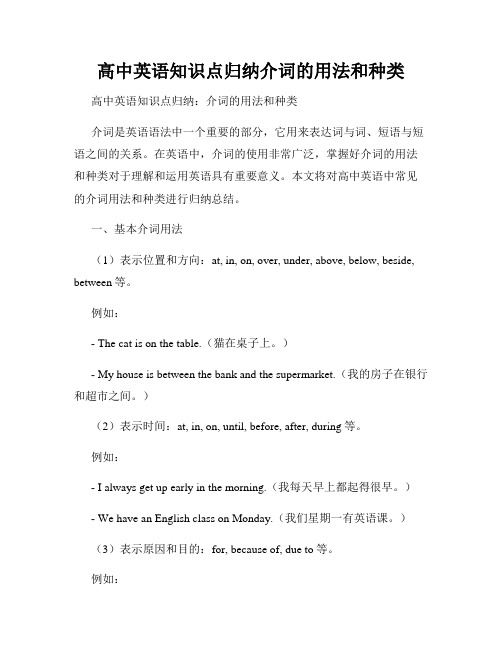
高中英语知识点归纳介词的用法和种类高中英语知识点归纳:介词的用法和种类介词是英语语法中一个重要的部分,它用来表达词与词、短语与短语之间的关系。
在英语中,介词的使用非常广泛,掌握好介词的用法和种类对于理解和运用英语具有重要意义。
本文将对高中英语中常见的介词用法和种类进行归纳总结。
一、基本介词用法(1)表示位置和方向:at, in, on, over, under, above, below, beside, between等。
例如:- The cat is on the table.(猫在桌子上。
)- My house is between the bank and the supermarket.(我的房子在银行和超市之间。
)(2)表示时间:at, in, on, until, before, after, during等。
例如:- I always get up early in the morning.(我每天早上都起得很早。
)- We have an English class on Monday.(我们星期一有英语课。
)(3)表示原因和目的:for, because of, due to等。
例如:- He apologized to her for being late.(他因为迟到向她道歉。
)- We canceled the trip due to the bad weather.(因为天气恶劣,我们取消了这次旅行。
)(4)表示方式和手段:by, with等。
例如:- We usually go to school by bus.(我们通常乘公交车去上学。
)- She writes with a pen.(她用钢笔写字。
)(5)表示比较和对照:like, unlike等。
例如:- He is like his father.(他像他父亲。
)- This book is unlike any other I've read.(这本书和我读过的其他书都不一样。
高中英语中常见的介词用法总结
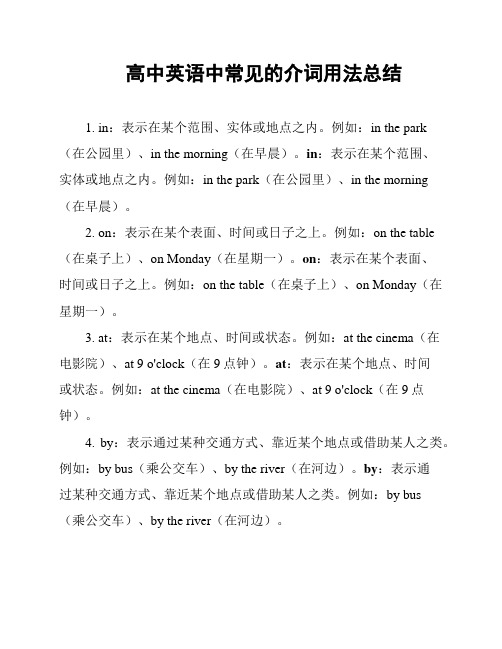
高中英语中常见的介词用法总结1. in:表示在某个范围、实体或地点之内。
例如:in the park(在公园里)、in the morning(在早晨)。
in:表示在某个范围、实体或地点之内。
例如:in the park(在公园里)、in the morning (在早晨)。
2. on:表示在某个表面、时间或日子之上。
例如:on the table (在桌子上)、on Monday(在星期一)。
on:表示在某个表面、时间或日子之上。
例如:on the table(在桌子上)、on Monday(在星期一)。
3. at:表示在某个地点、时间或状态。
例如:at the cinema(在电影院)、at 9 o'clock(在9点钟)。
at:表示在某个地点、时间或状态。
例如:at the cinema(在电影院)、at 9 o'clock(在9点钟)。
4. by:表示通过某种交通方式、靠近某个地点或借助某人之类。
例如:by bus(乘公交车)、by the river(在河边)。
by:表示通过某种交通方式、靠近某个地点或借助某人之类。
例如:by bus(乘公交车)、by the river(在河边)。
5. to:表示方向、目标或接触某物。
例如:go to school(去学校)、give it to me(给我)。
to:表示方向、目标或接触某物。
例如:go to school(去学校)、give it to me(给我)。
7. with:表示陪伴、带有某种特征或使用某物。
例如:play with friends(和朋友一起玩)、a book with a red cover(一本封面是红色的书)。
with:表示陪伴、带有某种特征或使用某物。
例如:play with friends(和朋友一起玩)、a book with a red cover(一本封面是红色的书)。
8. for:表示目的、目标或所属关系。
介词常见11个用法归纳

介词常见11个用法归纳介词是连接词语与其他词语或词组的一种词类。
以下是介词的常见用法归纳:1. 表示地点:at, in, on例如:at school(在学校)、in the park(在公园)、on the table(在桌子上)2. 表示方向:to例如:go to the library(去图书馆)3. 表示时间:at, in, on例如:at 9 o'clock(在9点)、in July(在七月)、on Monday(在星期一)4. 表示原因:because of, due to例如:He failed the test because of his laziness(他因为懒惰而考试不及格)5. 表示目的:for例如:I bought some flowers for my mother(我买了些花给我妈妈)6. 表示手段或方式:by, with例如:She traveled to Paris by plane(她乘飞机去巴黎)7. 表示比较:than例如:He is taller than his sister(他比他姐姐高)8. 表示身份或性质:as例如:He works as a doctor(他是个医生)9. 表示关系:of例如:a book of poems(一个诗集)10. 表示来源:from例如:I received a gift from my friend(我收到了一份来自朋友的礼物)11. 表示递进或对比:besides, but, except, apart from例如:She likes all kinds of food, besides seafood(她喜欢各种食物,除了海鲜)。
介词的用法总结大全

介词的用法总结大全介词是连接名词、代词、动词或副词与其他部分的词类,用来表示位置、方向、时间、原因、目的、手段等关系。
以下是介词的用法总结:位置和方向:1. at:表示位置处于一些地点、其中一层次或其中一方向。
例如:at home(在家);at the top(在顶部)。
2. in:表示位置在一些区域、一些空间范围内。
例如:in the park (在公园里);in a box(在盒子里)。
3. on:表示位置在一些平面、表面上。
例如:on the table(在桌子上);on the wall(在墙上)。
时间:1. at:表示具体的时刻或一些时间点。
例如:at 9 o'clock(在九点钟);at noon(在中午)。
2. in:表示段时间的范围、一些季节、其中一年份或测算未来时间的过程。
例如:in May(在五月);in the 1990s(在20世纪90年代)。
3. on:表示一些具体的日期或星期几。
例如:on Monday(在星期一);on June 1st(在六月一日)。
原因和结果:2. due to:表示由于一些原因引起的结果,通常用于正式场合。
例如:The delay was due to technical problems(延误是由技术问题引起的)。
目的和目标:1. for:表示为了一些目的或目标。
例如:He studied hard for the exam(他为了考试而努力学习)。
2. to:表示向一些目的地或一些人传递信息等。
例如:I went to the supermarket to buy some groceries(我去超市买些杂货)。
手段和方法:1. with:表示使用其中一种工具、手段或方法。
例如:She cut the cake with a knife(她用刀切蛋糕)。
2. by:表示通过其中一种手段或方法。
例如:We traveled to the city by train(我们乘火车去了城市)。
高中英语知识点归纳介词的用法与搭配

高中英语知识点归纳介词的用法与搭配高中英语知识点归纳:介词的用法与搭配介词在英语中起到连接词或短语之间关系的作用。
熟练掌握介词的用法与搭配对于理解和运用英语语法和表达非常重要。
下面是对高中英语中常用介词的用法与搭配进行归纳总结。
一、介词的基本用法1. of:表示所属关系、来源、构成等。
- The book of John is on the table.(约翰的书在桌子上。
)- The Statue of Liberty was a gift from France.(自由女神像是法国赠送的。
)2. in:表示位置、时间、状态等。
- He is in the room.(他在房间里。
)- I will see you in an hour.(我一个小时后会见你。
)3. to:表示目标、方向等。
- She went to the library to borrow some books.(她去图书馆借书。
) - Please give this letter to him.(请把这封信交给他。
)4. at:表示位置、时间等。
- We will meet at the park.(我们将在公园见面。
)- I have a meeting at 9 o'clock.(我9点有个会议。
)5. for:表示目的、原因等。
- I bought a gift for my friend's birthday.(我为我朋友的生日买了一份礼物。
)- He apologized for being late.(他为迟到而道歉。
)二、介词与名词的常见搭配1. on:- on the table(在桌子上)- on Monday(在星期一)2. in:- in the room(在房间里)- in the morning(在早上)3. at:- at the park(在公园)- at the party(在聚会上)4. to:- go to school(去上学)- talk to the teacher(和老师交谈)5. for:- a gift for her(给她的礼物)- thanks for your help(感谢你的帮助)三、介词与动词的常见搭配1. look at:看- He looked at the picture on the wall.(他看着墙上的画。
高考介词用法总结

高考介词用法总结高考介词用法总结介词是英语中非常重要的一种词类,它可以表示时间、地点、方式等等。
在高考中,介词的应用非常广泛,考生必须掌握其正确的用法。
下面将从时间、地点、方式三个方面总结介词的用法。
一、时间1. atat 表示具体的某个时刻,如 at 7 o'clock, at noon, at night。
例句:I will meet you at 3 o'clock this afternoon.2. inin 表示一个时间段或一个月、季节等长时间内,如 in the morning, in June, in winter。
例句:I usually go for a walk in the morning.3. onon 表示某一天或具体的某个日期,如 on Monday, on May 1st。
例句:We will have a meeting on Friday.4. duringduring 表示在整个某段时间内发生的事情,通常与名词连用,如during the holiday。
例句:I read a lot of books during the summer vacation.5. forfor 表示持续的时间段,通常与表示时间段的名词连用,如 for two hours, for three days。
例句:He has been studying English for three years.二、地点1. atat 表示在一个特定地点,在某处停留或活动,如 at school, at home。
例句:My sister is studying at university.2. inin 表示在某个范围内,如 in the room, in the city。
例句:There are many people in the park.3. onon 表示在某个表面上,如 on the table, on the wall。
高中英语常见介词用法

介词(一)介词的综述介词是一种虚词,不能单独使用,介词后必须与名词、代词、或动名词构成介词短语在句中充当一个成份,表示人、物、事件等与其它人、物、事件等之间的关系。
(二)介词的类别1.时间介词注意:①.区分in或on.泛指一般的上午(下午)时用in,但特指某日的上午(下午)时用on。
例如:in the morning在早上;on sun day morning在周日早上②.比较:for和 duringfor之后大多跟表示时间、天数等的数字名词,而during后决不能跟表数字的名词。
2.地点介词(1)at,in1) at:在某地点(表示比较狭窄的场所)(小地方)例如:at school 上学at home 在家;at 2 Baker Street 在贝克街2号;at a factory 在一家工厂I'll meet him at the Beijing railway station.我将去北京站接他。
2)in:在某地(表示比较宽敞的场所)(大地方)例如:in Beijing 在北京in China 在中国;in the world 在世界上;in the street 在街上(2)in, on, to1)in表示表示方位,表示在某范围内,即一个小地方处在一个大地方的范围(疆域)之内。
例如:China is in the east of Asia. 中国在亚洲东部。
(中国是亚洲的一个国家,处于亚洲的范围之内)Guilin is in the north of Guangxi. 桂林在广西北部。
(桂林是广西的一座城市)The sun rises in the east and sets in the west. 太阳东升西落。
2)on表示方位,含义是"在......端/边",即一个地方在另一个地方的某一端或某一边,两个地方只是相邻或接壤,却互不管辖。
例如:Mongolia(蒙古国))is on the north of China.Guangdong Province is on the southeast of Guangxi. 广东省在广西的东南边。
高中英语介词用法详解

介词用法详解用来表明名词、代词与句子中其他词的关系的词叫做介词..介词是虚词;不能重读;也不能单独作句子成分;往往与名词、代词或相当于名词的其他词类、短语、从句一起构成介词短语;以表示它与其他词在时间、方式、方向、位置等方面的关系..Ⅰ介词的用法:1. 作状语:表示时间、地点、方式、条件、目的、原因等..He left after a while.过了一会他离开了..表时间Thanks to your advice; we completed the project on time.多亏了你的建议;我们按时完成了工程..表原因I live near my company.我住在公司附近..表地点We held a party in honor of our friends.我们举行宴会款待朋友..表目的2. 作表语:My home is just opposite the university.我家就在大学对面..We are of the same age.我们年龄一样大..The book is worth reading.这本书值得一读..We are like brothers and sisters.我们就像兄弟姐妹..3. 作定语:介词作定语时常放在被修饰词或短语的后面..The man next to Bill is from Spain.比尔旁边的那个人来自西班牙..I am a student of the English Department.我是英语系的学生..The young man with red hair is Tom.红头发的那个年轻人是汤姆..There is no news about the accident.没有关于这次事故的消息..4. 作补足语:Make yourself at home.不要拘束..I found Mary in a red dress today.我发现玛丽今天穿着一件红裙子..Keep the dog out of the house.让狗呆在外面..Don’t leave your books all over the desk.不要把你的书放的满桌子都是..Ⅱ介词的分类及使用1.表示“时间”的介词1)inin 表时间段;即指在较长的一段时间内;相当于during..如世纪、朝代、年代、年、月、季节等..in Ming Dynasty 在明朝in the 1980s 在二十世纪八十年代in August 在八月份in spring/summer/autumn/winter 在春天/夏天/秋天/冬天in the winter holidays 在寒假in one’s life 在某人一生中in the daytime/night 在白天/夜里in the year 2010 在2010年注意:during 除了具有in表示时间段的功能之外;还可指在某一项活动的过程中..during the night 在晚上during the fire 在火灾期间in也可表将来;表示从现在算起的一段时间之后..in a while 一会儿;立刻I’ll be back in an hour. 我一小时后回来..2)atat用来表示时刻、时间的一点..at five o’clock 在五点种at soon 在中午at half past five 在五点半at也可表示较短暂的一段时间;可用在节日名词或被认为是一年中标志大事的日子..at daybreak 破晓at Christmas 在圣诞节3)onon表示在具体的某一天;某一天的上午、下午或晚上;或对某一天或某一天的上午、下午、晚上进行详细描述..on Monday afternoon 在星期一下午on that day 在那天on a sunny day in November 在十一月一个晴朗的日子on the following day 在第二天on New Year’s Day 在元旦on the morning of April the first 在四月一日上午on weekends 在平日时4)in; afterin和after都可表示“……时间之后”..“in + 时间段”用于将来时;He’ll be back in three hours.他三个小时以内回来..“after + 时间段”用于过去时..after后接一个具体的时间点时;也可用于将来时..He came back after three hours.三个小时之后他回来了..He’ll be back after three o’clock in the afternoon.他下午三点以后回来..5)for; sincefor后接一段时间的词语;表示行为状态持续的时间..I have been learning English for 20 years.我学英语二十年了..He worked here for three years and then changed his job.他在这儿工作了三年后换工作了..since后接某一具体时间或表示具体时间的从句;强调动作或行为状态从起始点一直持续到现在;常与延续性动词的现在完成时连用..I have been watching TV since supper time.自晚饭以来我一直在看电视..She has worked here since 1999.自1999年以来;她就在这里工作..6)before; by二者都可表示“在……之前”;但by含有“最晚不迟于……”“到…….为止”的意思..如果by后是表示将来的时间;则与将来时或将来完成时连用..过去的时间;则与过去完成时连用..I’ll be back before supper time.晚饭前我会赶回来..Supper will be ready by 6:00.晚饭将在6点之前准备好..This factory had produced more than one million cars by the end of last year.到去年年末;这家工厂已经生产了一百多万辆小汽车..I will finish the work by Friday. 最晚星期五我会完成这项工作..before Friday. 星期五之前我会完成这项工作..7)by; untilby表示到什么时候为止动作已经完成..until表示动作持续到什么时候..注意:在终止性动词的否定式中;二者通用..Can you repair my bike by Friday星期五之前你能修好我的自行车吗I’ll work here until six o’clock.我将一直在这里工作到6点..The work won’t be finished by/until tomorrow.这项工作明天才能做完..8)since; afterafter从过去或将来某一时间算起的一段时间后;这时不可与完成时态连用..从现在算起的一个时间点之后;这时常与将来时连用..I woke up at midnight and after some time I heard some strange noise.我半夜醒来;一会儿后;听见了一些奇怪的声音..After supper; I will take a short walk.晚饭后;我将散散步..since 后只能跟时间点或表示时间点的从句;表示从过去某一时间点一直到现在;与完成时连用..I have been watching TV since suppertime.自晚饭以来我一直在看电视..2.表示“地点、方位或方向”的介词常见的方位介词有:in; on; over; under; above; below; in front of; in the front of; before;at the back of; out of; outside; inside; beside; beneath; beyond; against; to; along;opposite; between; among; through; across; over; past等..1)on; inon是指在某物的表面上;与物体表面接触..其反义词是beneath..They are sitting on the grass.他们正坐在草地上..A lovely cat is lying on the table.一只可爱的小猫正躺在桌子上..The little mouse is beneath the paper; so it is not easy to find.这只小老鼠在纸下面;所以不容易被发现..英语中打击人的头、额、鼻、耳、颈、肩、腿等部位时;用on..The headmaster patted the boy on the head and comforted him.校长拍拍小男孩的头安慰他..表示植物本身生长出来的枝叶、花果等用on..There are a lot of pears on the tree.树上有许多梨..in表示“在……之上”时;暗示占去了某物的一部分;强调接触的深度..There is/are a hole/two windows in the wall.墙上有个洞/两扇窗户..英语中打击人的脸、眼、嘴、胸、腹等部位时;用in..表示植物本身以外的人或动物“在树上”;用in意指枝叶遮掩其中..2)over; above; under; belowover强调在物体的正上方..under强调在物体的正下方;是over的反义词..The bridge over the river has a long history.河上的这座桥历史悠久..We took shelter from the rain under a tree.我们在树下躲雨..注意:above还有“覆盖;越过”之意..The thief climbed over the wall and ran away.那个贼翻过围墙逃走了..above强调在物体的上方;但不一定是正上方;还可以指温度;海拔等的刻度..The plane flew above the clouds.飞机在云层之上飞行..The average temperature here in winter is above 3℃.这里冬天的平均温度超过三摄氏度..The mountain is about 2;000 meters above the sea.那座山海拔约2;000米..The sun has risen above the horizon.太阳已经升至地平线上了..below强调在下方;但不一定是正下方;可指温度海拔等的刻度;是above的反义词..I live below the mountain.我住在山脚下..3)in; on; to在方位名词前的区别三者都可用来表示两地之间的方位关系..in表示在某范围之内Hebei Province is/lies in the east of China.to表示在某范围之外Shanghai is/lies to the southeast of Hebei Province.on表示“毗邻”“接壤”Vietnam is/lies on the north of China.Japan lies in the east of Asia and to the east of China.日本位于亚洲东部;与中国隔海相望..Mongolia lies on the north of China.蒙古国与中国北部毗邻..4)in; at二词均可表示“在……处”..in用于指较大的地方..He lived in Beijing for 10 years.他在北京生活了十年..at用于指较小的地方;如在门牌号码前..We’ll meet each other at the park.我们将在公园见面..5)from; out of二词均表示来源或出处..from注重起点;意为“从……”..The train from London arrives here at 10 o’clock.从伦敦来的火车10点到这..out of侧重于从里向外;意为“从……里出来”..She took the passport out of her handbag and showed it to the policeman.她从包里拿出护照把它交给警察..We are moving out of our school yard.我们正从校园出来..6)between; among二者均表示“在……中间”、“在……之间”..between表示在二者之间;有时出现三个或三个以上的“宾语”;但这时强调的仍然是其中每两者之间的相互关系..The house stands between two farms.那座房子位于两个农场之间..Luxemburg lies between France; Germany; and Belgium.卢森堡位于法国、德国与比利时之间..among指在三者或三者以上之间..There is a forest among the hills.那些小山之间有一片森林..注意:当句中出现divide; share之类的词时;如果后面跟着几个单数名词;用between..如果后面是复数名词;between和among都可以..He divided his money between Mary; John and Helen.他把钱分给玛丽、约翰和海伦..7)across; through; past; overacross强调穿过某一平面或横穿狭长物体;宾语常为the square; the bridge; the mountain; the street等..He swam across the river.他游过了河..Be careful while walking across the street.过街时务必小心..through强调从某一空间内穿过或沿着狭长的物体移动..宾语常为the street; the forest;the gate; the valley等..We walked through the forest.我们穿过那片森林..Walk through the gate and you’ll see the rest room.穿过大门就会看到厕所..past强调从某事物的一旁经过..They drove past a big supermarket.他们开车经过一家大超市..over强调从一边到另一边或越过某一高度;宾语常为the street; the bridge; the mountain; the square等..The dog jumped over the fence and ran away.狗跳过栅栏跑了..The plane flew over the Great Wall.飞机飞过长城..8)in front of; in the front ofin front of表示在某一空间外部的前面..In front of my home runs a small river.在我家门前有一条小河..We planted some trees in front of our house.我们在房子前面种了一些树..in the front of表示在某一空间内部的前面..Don’t sit in the front of the car.不要坐在小汽车的前部..9)to; for; towardsto用在表示来往行动的动词后;如go; come; walk; run; dash; rush; move; fly;return; lead; take之后;表示行动的方向..for多用于表示“启程”;“出发”“离开”的动词;如leave; set off; start之后..to与towards在表示“朝……方向”时;可互换;towards仅表示方向;不表示到达;而to不仅表方向;还表示到达..It’s difficult to decide which area the plane is flying to.很难断定飞机要飞往哪个地区..My sister is leaving for New York early tomorrow morning.我妹妹明天上午要动身去纽约..3.表“工具、手段、方式、材料”的介词1)with; by; in三者均表示“用”;表示行为的工具、手段或方式..(1)with多指用有形的工具、身体的某部位或器官;其后的名词多被冠词、物主代词等修饰..You can see it with your own eyes.你可以亲自去看看..I cut the cake with a knife.我用刀子切蛋糕..(2)by表示使用方法、手段或用于无形的工具前..Why don’t you go there by bus instead你怎么不坐公交车去那呢They can learn what kind of animal it is by touching.他们可以通过触摸了解它是何等动物..(3)in指使用某种语言、文字、材料等..in English; in ink; in capital; letters注意:其他表方式/方法、情况、手段的表达法..in this/that; the/same way; by means of; by this/that means;with this/that method;by telephone/on the telephone; by/through practice; by/through experienceon foot; live on foodin surprise; in silence; in a low voice; in a hurry; in fun; in joy; in sorrow;in danger; in safety; in need.2 by; in; on三词都可表示旅行的方式..(1)不涉及交通工具的名词时用by;名词前不用冠词..by sea; by water; by rail; by air(2)涉及交通工具的名词前用by;但名词需用单数;其前不加冠词或任何修饰语..by taxi; by bike; by plane; by ship; by train; by spaceship等..(3)当旅行方式涉及确定特指的交通工具时;用on或in;名词前应有冠词、物主代词、指示代词等修饰语..in a plane; on a early train; on my bike等..注意:步行、骑马、骑骆驼均用on..on foot; on a horse; on the camel等..4.表示“排除”的介词1)except:“除……之外不再有”;与but通用;常与不定代词all;every/any+thing/where/body/one;或nobody; nothing等连用..All of us have been to Shanghai except me.所有人都去过上海;只有我没去..None of the films interested me except but a cartoon.除了一部动画片;其他电影我都不感兴趣..注意:but; except在一般情况下;二者可通用;都可接名词、代词、动名词、动词原形..但except后接副词、介词短语、when从句等时不可用but来替换..Nobody but/except Mary knows the city well.只有玛丽非常了解这个城市..The window is never opened except in summer.除夏季外;这扇窗户从不打开..He has always been busy except when it is Sunday.除星期日外;他总是很忙..说明:but; except后都可接that从句作宾语;可以互换..I asked nothing from him but except that he should write to me every otherweek.我只要求他每两周给我写一封信..2)except for:用于表示对主要部分的肯定和对局部的否定;主要侧重对不同类事物的排除..The street in the early morning is very quiet except for a few cars.清晨街道十分安静;只有几辆小汽车..The composition is good except for a few spelling mistakes.除几处拼写错误外;这篇作文很好..All the buildings are excellent except for their location.除了位置之外;所有的建筑物都相当不错..注意:当except位于句首时;后面往往要加上for..Everything is in good order except this.= Except for this; everything is in good order.3)besides: 表示“除……之外其他的也”;其后的宾语是包括在内的..All of us have been to Shanghai besides me.我们所有人都去过上海;我也去过..The cowboy movie also interested me besides a cartoon.除了一部动画片;西部片我也感兴趣..We need three more chairs besides these two.除了这两把之外我们还需要三把椅子..注意:besides还可以作副词;意为“另外”..Let’s stay at home. It is too late; besides; it is raining now.我们呆在家里吧..天太晚了;而且正下着雨..4 including强调同类事物中包含具有另外特征的一部分..There are 20 passengers on the bus; including five children.公交车上有20名乘客;包括5个孩子..5.表示“关于”的介词about; on; of都可表示“关于”..about侧重于与人或事物有关的事迹或情况;涉及的内容比较详细..The headmaster told us a story about his student.校长给我们讲了一个他学生的故事..I have heard quite a lot about you from others.我从别人那儿听到不少关于你的情况..on侧重于阐述或论及相对重大或深奥的理论、学术等问题..Who made the report on the situation in the Middle East这个论述中东形势的报告是谁做的He wrote a book on electricity.他写了一本关于电学方面的书..of在与tell; read; know; think等动词连用时侧重于粗略涉及..I know little of our new teacher.我几乎不了解我们的新老师..He spoke of the problem at the meeting.他在会议上谈到了这个问题..6.表示“像”的介词表示“像”的介词有as; like; 两词的区别如下:1)介词as表示“以……身份”或“当作”;后面跟表示身份、职业、地位、人的特征的名词作宾语;As a teacher; he cares for these children.作为教师;他关心这些孩子..表示“像”时;as常构成固定搭配;如:such…as; as…as; not so…as; the same…asThe boy is as tall as his father.那个男孩长的和他父亲一样高..2 两词的侧重点不同:as侧重于同一性;强调属同一类或完全相似..She spoke of me as her dearest friend.她谈起我就像我是她最亲密的朋友似的..like侧重于比较;表示比喻;并不意味着同一类或完全相似..He spoke like an old friend.他像老朋友那样讲话..注意:as和like常与一些动词一起构成固定搭配..consider…as 认为;视作look upon… as 把……看作regard…as 视作;看作treat…as 看作seem like 似乎像look like 看起来像7.表示“原因”的介词1)with多用于表示情绪的形容词或表示身体动作或状态的动词之后;说明引起某种心理状态的原因..Her face went red with anger.她气得脸都红了..They smiled with pleasure.他们高兴地微笑着..2)over常用于带有感情色彩的动词;如argue; cry; quarrel; laugh; sign;等之后;叙述所发生事情的原因..These men argued over money matters.这些人为了钱的问题而争吵..3)from常接抽象名词;表示自然或间接的原因;尤指外因..Lots of people suffered from hunger in those days.在那些日子里;许多人都遭受了饥饿之苦..4)at常表示某种表情或情感的起因;常和表示听、看或表示喜怒哀乐、吃惊等的过去分词或形容词连用..He looked shocked at the news of his failure.听到他失败的消息;他非常吃惊..5)of多用于表示自身的原因;即内因..如疾病、情感等..Her mother died of cancer.她母亲死于癌症..6)for多与表示感情的抽象名词或动词及reason; famous等词连用..I’m sorry for being late.很抱歉我迟到了..注意:几组近义词1.It is + adj. + for of sb. to do sth.当形容词说明不定式逻辑主语的特性特征时;即形容词是说明sb.的性质、特征时用of..It is + adj. + of sb. to do sth. = sb. + be + adj. + to do sth常见的形容词有:kind; good; nice; clever; stupid; foolish; polite; impolite; cruel.等..It is kind of you to help the disabled students.= You are kind to help the disabled students.当形容词说明不定式的性质时;用for; 常用的形容词有:important; necessary; possible;impossible等..It is important for you to learn English well.2.for与to的搭配问题形容词后的for与to:1 当形容词被副词too或enough修饰时;其后只能用for..The box is too heavy for me.2 当侧重于与别人比较;有“就……而论”之意时;常用for..Chinese is very difficult for me; I can’t learn it.3 当侧重于主观看法;有“以……看来”之意;常用to..Chinese is very difficult to me; but I’ll try my best to learn it.for与to接后置的间接宾语:1 buy/cook/fetch/find/get/make/order/save/sing…+sth. +for sb.2bring/give/leave/lend/offer/pay/pass/read/refuse/return/promise/send/show/teach/tell/throw/write…+sth. + to sb.3. in与of表示比较范围二者均可引出比较的范围;适用于形容词和副词的最高级;指三者或三者以上人或事物的比较..in表示限定在某个范围内的最高级..of表示同一类人或事物中的最高级;也可用于两者之间的比较级;但比较级前须加定冠词the..The Changjiang River is the longest river in China.Of all the three students; John is the tallest.This composition is the better of the two.3.of; to与一些抽象名词的搭配1)of + 抽象名词相应的形容词抽象名词前可以有great; much; no等的修饰词..It is of great value. =It is very valuable.It is of no use. = It is not useful. = It is useless.2 to与情感名词连用;表示“使某人……的是”to one’s + sorrow delight; joy; surprise; regret; horror… = to the sorrow delight; joy;surprise; regret; horror… of sb.一些常用介词的搭配1.at的搭配1与名词搭配:at dawn 拂晓at dusk 黄昏at first 当初at noon 中午at night 夜间at last 最终at sunrise/sunset 日出/日落at home 在家at table 在用餐at school 在上学at college 在上大学at present 目前at the moment 此刻at risk 在危险中at rest 静止不动2与形容词搭配:angry at sb. 对某人言行生气annoyed at 因……而恼火good at 擅长clever at 擅长surprised at 感到惊讶2.in的搭配1与名词的搭配:in a hurry 匆忙in a low voice 低声in high/poor spirits 情绪高涨/低落in tears 热泪盈眶in fear 在恐惧中in danger 在危险中in safety 很安全in silence 静静地in good health 身体好in public 在公共场所in doubt 有疑问in a whisper 低声说in time 及时in town 在城里in flower 在开花2与形容词搭配:different in 在某方面不同dressed in 穿着engaged in 忙于faithful in 在……方面忠诚disappointed in/with sb. 对某人感到失望strict in 在……方面严格weak in 在……方面薄弱interested in 对……感兴趣3.from的搭配1与名词搭配:from memory 凭记忆from day to day 日复一日from beginning to end 从头到尾2与形容词搭配:far from 远离different from 与……不同absent from 缺席……free from 没有4.to的搭配1与名词搭配:access to 能够进入key to……的答案钥匙answer to……的答案notes to……的注释visit to 到……的访问response to 对……的反应way to 通向……的路attention to 对……的注意danger to 对……的危险advantage to 对……有利2与形容词搭配:had to 对……态度不好close to 在……的附近devoted to 忠于;专心于equal to 和……相等familiar to 为……所熟悉contrary to 与……相反due to 由于married to 与……结婚faithful to 对……忠诚cruel to 对……残忍next to 挨着rude to 对……粗暴5.with的搭配1与名词的搭配:with a sneer 嘲笑地with a laugh 哈哈大笑with a sigh 唉声叹气地2与形容词搭配:annoyed with sb. 对某人恼火careless with 不爱惜crowed with 挤满了angry with 对……感到生气careful with 注意、细心familiar with 对……熟悉strict with 对……严厉busy with 忙于……patient with 对……有耐心popular with 流行6.of的搭配lack of 缺乏…… ashamed of 因为做某事而羞耻aware of 意识到careful of 注意;珍重conscious of 知道;明白fond of 喜欢afraid of 对……感到害怕careless of 不在乎composed of 由……组成7.on的搭配1)与名词搭配:influence on 对……的影响effect on 对于……的影响report on 对……的报道attack on 对……的进攻emphasis on 加强注意congratulations on 对某事祝贺mercy on 对于……的宽容2)与形容词的搭配:dependent on 依靠8. 其他一些常用短语:according to 根据apart from 除……之外as to 关于;至于as far as 就……而论at the sight of 看到but for 要不是instead of 代替;而不due to 因为owing to 由于in addition to 除了……之外还有in case of 如果in search of 寻求at the mercy of 在……掌控之中at the risk of 冒……的危险in charge of 对……负责in spite of 尽管;即使in time of 在……时刻in honor of 为纪念for fear of 唯恐on account of 因为;由于on behalf of 代表the sake of 为了……的缘故up to 直到;由……而定thanks to 因为;多亏in comparison with 和……相比in connection with 与……有关。
高中英语45个介词的基本用法
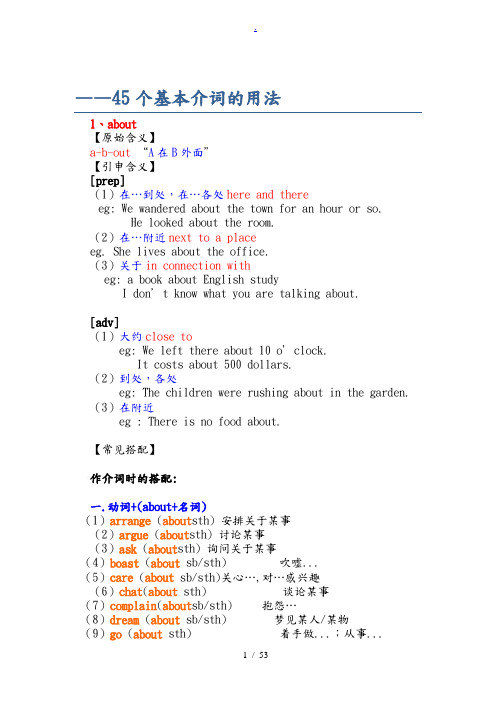
——45个基本介词的用法1、about【原始含义】a-b-out “A在B外面”【引申含义】[prep](1)在…到处,在…各处here and thereeg: We wandered about the town for an hour or so.He looked about the room.(2)在…附近next to a placeeg. She lives about the office.(3)关于in connection witheg: a book about English studyI don’t know what you are talking about.[adv](1)大约close toeg: We left there about 10 o’clock.It costs about 500 dollars.(2)到处,各处eg: The children were rushing about in the garden.(3)在附近eg : There is no food about.【常见搭配】作介词时的搭配:一.动词+(about+名词)(1)arrange (about sth) 安排关于某事(2)argue (about sth) 讨论某事(3)ask (about sth) 询问关于某事(4)boast (about sb/sth) 吹嘘...(5)care (about sb/sth)关心…,对…感兴趣(6)chat(about sth) 谈论某事(7)complain(about sb/sth) 抱怨…(8)dream (about sb/sth) 梦见某人/某物(9)go (about sth) 着手做...;从事...(10)hear (about sth) 听说...(11)know(about sth) 了解...(12)learn (about sth) 得知某事(13)put (about sth)散布(谣言等)(14)quarrel (about sth) 为...争吵(15)see (about sth) 负责处理...(16)talk(about sth) 谈论...(17)think (about sth) 考虑..(18)warn sb (about sth) 告诫某人关于某事(19)wonder(about sb/sth) 对.. 好奇(20)worry(about sb/sth) 对...担心二、名词+(about+名词)(1)concern (about sb/sth)对…的关心/关怀(2)curiosity (about sb/sth) 对…的好奇(3)doubt (about sb/sth)对…的怀疑(4)ethusiasm (about sth) 对…的热情(5)information (about sb/sth) 关于…的信息(6)remark (about sth) 对…的评论(7)opinion (about sth)对…的意见(8)view (about sb/sth) 对...的观点三、be+adj+(about+名词)(1)be angry(about sth)为…而生气(2)be anxious(about sth)为…忧虑(3)be careful(about sth)当心…(4)be cautious (about sth) 谨防...;对...持谨慎态度(5)be certain(about sth)确信关于某事(6)be curious (about sth)对…感到好奇(7)be disappointed(about sth)对…感到失望(8)be excited(about sth)对…感到兴奋(9)be glad/happy(about sth)对…感到高兴(10)be hopeful(about sth)对…抱有希望(11)be crazy/mad/wild(about sth)对…痴狂;酷爱某事(12)be nervous(about sth)为…感到不安/因...感到紧(13)be optimistic/positive (about sth)对...是积极乐观的(14)be particular (about sb/sth) 对... 讲究,挑剔(15)be sad(about sth)为…而难过(16)be serious(about sth)对…认真(17)be sorry (about sth) 对...抱歉作副词时的搭配:名词+动词+about(1)sth come about某事发生(2)sth getabout某事(尤指消息等)传开(3)sb turn about某人转身(4)sb wanderabout某人徘徊,游荡(5)sb walk about某人走来走去2、above【原始含义】a-b-over“A在B上方”【引申含义】prep.(1)在…上方at or to a higher place than sth/sbeg: The sun rose above the horizon.(2)数目大于…/重量超过…/价格(能力、地位)高于…more than sth.; greater in number,levelor age thansb./sth.eg: There is nothing in the store above 50 cents.(3)重要性或质量超过、胜过of greater importance or of higher quality than sb/stheg. I rate her above most other players of her age.(4)声音超过…louder or clearer than another soundeg: I couldn’t hear her above the noise of the traffic.(5)不至于,不屑于做某事too good or too honest to do stheg. She is above suspicion.【常见搭配】一、动词+(above+名词)(1)live ( above one’s income) 入不敷出地生活(2)put A(above B)把A看得比B更重要(3)rise (above sth) 克服...,不受....的影响(4)talk (above one’s head) 高深莫测地谈论二、be+(above+名词)(1)be(aboveoneself)兴高采烈= be in one’s high spirit(2)be (above one’s head)难以理解/超出某人理解能力3、across【原始含义】a-grass“一片草坪”,across指在平面上经过,就像人走过一片草坪那样。
- 1、下载文档前请自行甄别文档内容的完整性,平台不提供额外的编辑、内容补充、找答案等附加服务。
- 2、"仅部分预览"的文档,不可在线预览部分如存在完整性等问题,可反馈申请退款(可完整预览的文档不适用该条件!)。
- 3、如文档侵犯您的权益,请联系客服反馈,我们会尽快为您处理(人工客服工作时间:9:00-18:30)。
高中英语介词用法大全介词(虚词),不能在句子中独立充当成分。
它总是用于名词、代词、或相当于名词的其它词类或短语活从句前。
需要掌握的介词有11个:in、on、at、to、from、by、with、for、about、after、before。
时间介词的用法辨析1. 时间介词in、on、at、by的用法辨析A.介词in用来表示一天中*段时间,指天、年、月、季节、周次等。
如:in the morningB.介词on用来表示*一天或星期几,指明具体的时间。
如:on a rainy dayC.介词at用来表示特定的时间、节日、年龄等。
如:at noonD.介词by表示…的时候、到、等到…已经等用在天、时间的前面。
如:by 2 o‘clock2. 时间介词in与after的用法辨析A.介词in + 一段时间用于一般将来时。
如:We’ll go to school in two weeks.B.介词after + 一段时间用于一般过去时。
如:My mother came homeafter half an hour.C.介词after + 时间点常用于一般将来时。
如:We’ll go out for awalk after supper.3. 时间介词for与since的用法辨析A.介词for 表示一段时间如:I have been living here for 10 years.B.介词since 表示从过去*一时间以来如:I have been living here since 2000.4. 时间介词during与for的用法辨析A.当所指的时间起止清楚时用介词during如:He swims every day during the summer.B.如果一段时间不明确则用介词for如:I haven’t seen her for years.5. 时间介词before与by的用法辨析A.介词before表示"在…之前〞如:He won’t come back before five .B.介词by表示"到…时为止,不迟于…〞如:The work must be finished by Friday.6. 时间介词till与until用法的异同和until用在肯定句中,均可表示"直到…为止〞,如:I will waittill(until)seveno'clock.和until用在否认句中,均可表示"在…以前〞或"直到…才〞。
如:Tom didn't come back till(until)midnight.多用于普通文体,而 until则用于多种文体,并且在句子开头时,用until而不用till。
如:Until he comes back,nothing can be done.7. 不用介词表达时间的几种情况A.当表示时间的词前有this, that时,其前面不用介词,如:this morningB.当表示时间的词前有ne*t时,其前面不用介词,如:ne*t SundayC.当表示时间的词前有last时,其前面不用介词,如:last SundayD.当表示时间的词前有one, any, each, every, some或all时,其前面不用介词,如:You can come any day.方位介词与地点介词的用法辨析1. 方位介词on, over, above的用法辨析A.介词on表示一物放在另一物上面,两者紧贴在一起,如:The book is on the table.B.介词over表示一种垂直悬空的上下关系,即"在…上方〞,如:Is there any bridge over the river"C.介词above表示一般的"高于…〞,"在…之上〞,如:There was an electric clock above his bed.2. 方位介词under与below的用法辨析A.介词under是over的反义词即"在…下方〞,如:They were seen under the tree.B.介词below是above的反义词即"低于…〞,"在…之下〞,如:They live below us.3. 方位介词across,、through、over,、past的用法辨析A.介词across着重于"从一头或一边到另一头或另一边〞,强调从外表穿过。
如:She went across the street to make some purchases.B.介词through着重于"穿越〞,强调从一定的空间内穿过。
如:The sunlight was coming in through the window.C.介词over多表示从"上方越过〞,如:He failed to go over the mountain; he had to go round it.D.介词past表示从"面前经过〞,如:Someone has just gone past the window.4. 方位介词in、on、at的用法辨析A.介词in表示"排、行、组〞,如:We are in Team One.B.介词on表示"左、右〞,如:Li Ping is on my left.C.介词at表示"前、后〞,如:I sit at the front of the classroom.5. 方位介词to、for的用法辨析A.介词to表示目的地或去的目的,如:Wil you take a train to Tianjian.B.介词for表示动身去*地,如:He got on a train for Shanghai.6. 地点介词at与in的用法辨析A.介词at表示较小的地方,如家、村、乡村等,如:He lives at a small village.B.介词in表示较大的地方,如大城市、国家、洲等,如:He lives in Beijing.7. 地点介词at与on的用法辨析A.介词at用于门牌号,如:He lives at No.200, Nanjing Road.B.介词on用于路名,如:He lives on Nanjing Road.8. 地点介词in、on、to的用法辨析A.介词in表示"包含〞如:Beijing is in the north ofChina.B.介词on表示"紧邻〞如:Canada lies on the north of theU.S.C.介词to表示"没接触〞如:France lies to the south of England.其他易混介词的用法辨析1. 动作介词to与toward的用法辨析A.介词to表示向*处移动,如:They were driving to work together.B.介词toward 表示移向*处,如:We're moving toward thelight.2. 原因介词because、as、for的用法辨析A.介词because表示"因为;由于〞指直接的、明确的原因,答复why的问句,语气最强。
如:The boy was absent because he was ill.B.介词as表示"由于;鉴于〞指一种显而易见、谈话双方的理由。
如:She stayed at home as she had no car.C.介词for表示"因为;由于〞指一种间接原因,甚至只是一种附带的说明。
如:It must have rained last night, for the road is wet.3. 材料介词of和from的用法A.介词of用于成品与材料的性质不变时,如:The desk is made of wood.B.介词from用于成品与材料的性质已变时,如:Wine is made from grapes.4. 表示"用〞的介词in、with、by的用法辨析A.介词in表示"用材料、语言〞如:Can you say it in English"B.介词with表示"用工具、*物〞如:with a penC.介词by表示"用、以、靠、通过…方法〞如:He prefers traveling by car.5. 介词between与among的用法辨析A.介词between 表示"在两者之间〞如:Don’t sit between the two girls.B.介词among表示"在…当中(三者或以上)〞如:They lived among the mountains in the past.6. 介词besides与e*cept的用法辨析A.介词besides表示"除…之外(全部计算在内)〞如:We have seen the crocodile besides Li Fang.B.介词e*cept表示"除…之外(不计算在内)〞如:We are all Chinese e*cept Tomin our class.经常有人被表方位的英语介词搞晕,不知道到底在什么位置用哪个词。
来来来,今天就用几张图告诉你们。
一目了然!图中是牛肉和黄油,在学习的同时看看美食,会不会饿的啊~~哈哈哈~介词(虚词),不能在句子中独立充当成分。
它总是用于名词、代词、或相当于名词的其它词类或短语活从句前。
需要掌握的介词有11个:in、on、at、to、from、by、with、for、about、after、before。
介词是同学们在学习中经常忽略的一个知识点,其实,用对介词,不仅能又快又好的做对题目,更能使你的英语显得超级地道哦!(图示在文章末尾)时间介词的用法辨析1. 时间介词in、on、at、by的用法辨析A.介词in用来表示一天中*段时间,指天、年、月、季节、周次等。
如:in the morningB.介词on用来表示*一天或星期几,指明具体的时间。
如:on a rainy dayC.介词at用来表示特定的时间、节日、年龄等。
如:at noonD.介词by表示…的时候、到、等到…已经等用在天、时间的前面。
如:by 2 o‘clock2. 时间介词in与after的用法辨析A.介词in + 一段时间用于一般将来时。
如:We’ll go to school in two weeks.B.介词after + 一段时间用于一般过去时。
